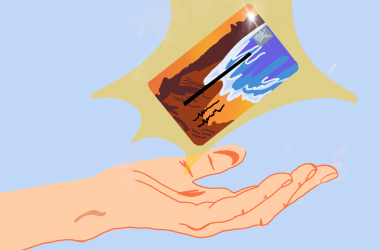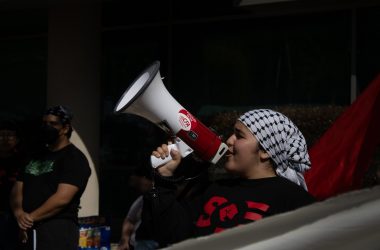On Aug. 5, Mahmoud Ahmadinejad was sworn in for his second presidential term over oppositional candidate Mir-Hossein Mousavi. It was a relaxing afternoon in my grandmother’s quiet home situated in Tehran’s northern suburbs.
I was napping on my grandmother’s couch when I was awakened by what sounded like gunshots and people yelling. I ran for the door and put on my Nike’s thinking they might come in handy. I was out the door before my grandmother could finish her sentence warning me to stay inside.
The scene on Valiasr Street, once known as Pahlavi Street before the 1979 Iranian Revolution, was frenzied. If chaos has a sound, it sounds like bugs softly buzzing nearby.
Two garbage cans had been lit on fire in the middle of the street. Groups screamed “Death to the dictator,” as Ahmadinejad hours earlier had sworn on the Koran to uphold his position as the president of Iran.
Revolutionary Guardsmen, police and Basij members used batons and rubber bullets to disperse the seemingly endless flow of people walking down the street. If you gathered in a crowd you were hit. If you chanted you were hit. If you ran, you were in for a beating.
The most extraordinary aspect of the whole experience is that the people who were in the middle of the mayhem were continuing to either protest or fight back. I witnessed a group of five older Iranian women trying to pry a young man out of the custody of riot police. After a few minutes of slapping the officers’ riot gear, the officers became either annoyed or ashamed and let go of him. The gentleman was bloody, handcuffed and shirtless as the women escorted him out of view into a nearby park.
The sidewalks were shared by silently walking protesters and the motorcycles of the security forces. As two bikes whipped past me with batons waving, the third gave me a gift to take back to America — a mild-concussion.
The protesters’ chants were somewhat hushed due to the urban environment of the street. With so many windows, nobody really knew who was watching.
For the protesters, this was not about chanting. Days earlier, Mousavi had called for his supporters to take to the streets by shopping, or at least giving the impression they were.
Mousavi specifically called for his supporters to not bring attention upon themselves, which is precisely what they did. Almost two months after Election Day, the domestic opposition continued to show the current government that they were not afraid.
I spent three terrifying and exhilarating hours walking down and back up Valiasr Street. Upon arrival home, my grandmother grabbed an ice pack. She grinned as I silently rested and thought about the beautiful disorder that I had just witnessed.
It’s too soon to predict the end result of this past summer’s uprising, but what the protests did produce is a clear divide in the 30-year-old revolutionary government. The future direction of Iran is dependent on the growing rift between two camps within the government; the pragmatics, or reformists, and the status quo.
The role of the supreme leader will determine the final outcome. Whether the top position continues as is, becomes a group of religious leaders, or develops as a rotating arrangement is yet to be seen.
The current government wasted an opportunity to harness the power of a seemingly large disenchanted group of people. They also failed to understand that the protesters were calling for reform, not revolution.
The current generation of young voters was not yet born when their parents revolted against the Shah in 1979. They wanted to leave their mark on Iranian history by making this election their own. Mousavi and his “Green Movement” conveniently supplied the vehicle to make history.
Millions of Iranians risked their lives to join the protests to call for their basic rights. It is now up to Iran’s reformist leaders, who have gained legitimacy from the Iranian people themselves.
That night, the shadows on the rooftops and their voices were particularly loud. “God is great,” they screamed. In four years, they will vote again.
I felt exhausted as I fell asleep, dreaming of the unparalleled reality that is today’s Iran.
Hanif Zarrabi is a Middle Eastern history graduate student for the Daily 49er.



